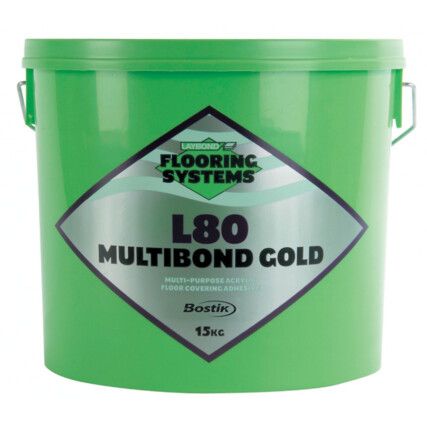Tile Adhesive & Grout
Choose from a wide range of tile adhesive and grout online at Cromwell.co.uk. We stock a comprehensive selection of adhesives and grouts to suit your projects from market-leading brands, like Bostik® and Everbuild®.
What is tile adhesive & grout?
Used together to adhere tiles to walls and floors and to fill the gaps in between for a neat finish, tile adhesive and grout are essentials when decorating bathrooms, kitchens and washrooms. Available in a range of different colours and for varying substrates, you can choose the perfect mix for your type of tiles and colour scheme.
Why buy tile adhesive & grout?
To ensure a reliable fix and attractive finish, no other product will do when tiling both walls and floors.
When to use tile adhesive and grout?
Whenever you plan to affix tiles to a surface, it's crucial to use tie adhesives or grout to firmly keep the tiles in place.
Tile adhesive & grout types
There are a lot of adhesives and grouts for tiling on the market, but choosing the right one for you doesn't have to be a difficult task. All quality products must feature CE compliance, with tile adhesive marked with the BS EN 12004 standard, while grout should feature BS EN 13888 standards.
Tile adhesives
• Cement-based tile adhesive - This is a mixture of cement, sand and other additives that forms a thin consistency. It's suitable for both indoor and outdoor tiling.
• Ready-mixed tile adhesive - Pre-mixed and ready to use, this type of tile adhesive tends to take longer to dry than other types, but makes for clean working.
• Reaction resin tile adhesive - A strong formula, this tile adhesive is ideal for tiling problematic surfaces, such as PVC and fibreglass.
• Flexible tile adhesive - Ideal for tiling floors, this flexible adhesive allows for a measure of movement in the finished job.
Grout
• Standard cement-based grout - Much like cement-based adhesive, this type of grout has a thin consistency to flow easily between tiles and give a smooth finish.
• Improved performance cement-based grout - Fortified with viscosity enhancing ingredients, this standard of cement-based grout allows for an easier application and even smoother finish.
• Reaction resin grout - Made with a blend of epoxy resins and filler, this type of grout doesn't absorb water or stains and cleans easily. The downside is that its extremely difficult to apply and must be done carefully to avoid staining porous surfaces.
Considerations when choosing tile adhesive & grout
• **Location** - some tile adhesives and grouts are suitable for both indoor and outdoor use, but make sure you've chosen the correct type for your project as cracked and damage grout is time-consuming to remove and replace.
• **Surface** - for standard tiling jobs where tiles are applied directly to a plastered wall, cement-based and pre-mixed adhesives are ideal. However, where the surface or substrate is made of metal, plastic finishing or fibreglass, a reactive resin product is best.
• **Tile type** - while most standard grouts will suit walls and floors, for projects that will be constantly exposed to water, such as a walk-in shower for example, reaction resin products, while harder to apply will provide a longer-lasting finish.
## Tile adhesive & grout jargon buster
We want to help you make the best purchase for your project, so we've outlined an applicable standard so you can better understand our product range..
*What does BS EN 12004-2:2017 mean?*
This standard outlines the performance characteristics of adhesives for ceramic tiles as well as other products from ICS categories, including concrete, cement, lime, and mortar. This standard includes test methods to determine the strength of all the tile adhesives outlined above.
*Let's break it down*...
• BS - An abbreviation for the British Standards Institute, this standard is maintained and reviewed under British law.
• EN - An abbreviation for European Norm as per the German translation, this highlights the affiliation with EU standards.
• 12004 - The legislation number.
• 2 - The part of the publication which refers to tile adhesive.
• 2017 - This is the publication date for this standard.
### FAQs
*Is grout the same as cement?*
Not the same, similar though. As you can see from the above list, there are some cement-based grouts available, and these contain cement powder as well as sand and water. The sand used for grout is finer than that used in cement to create the thinner viscosity needed to fill the void between tiles, while cement has the addition of aggregate to strength.
*What is the best tile adhesive for a bathroom?*
For tiles that will be exposed to high levels of moisture, resin adhesive or cement-based adhesive are the best choices. Resin adhesive is notoriously difficult to apply and is mostly used by professionals, while cement-based products will also give a quality finish.
